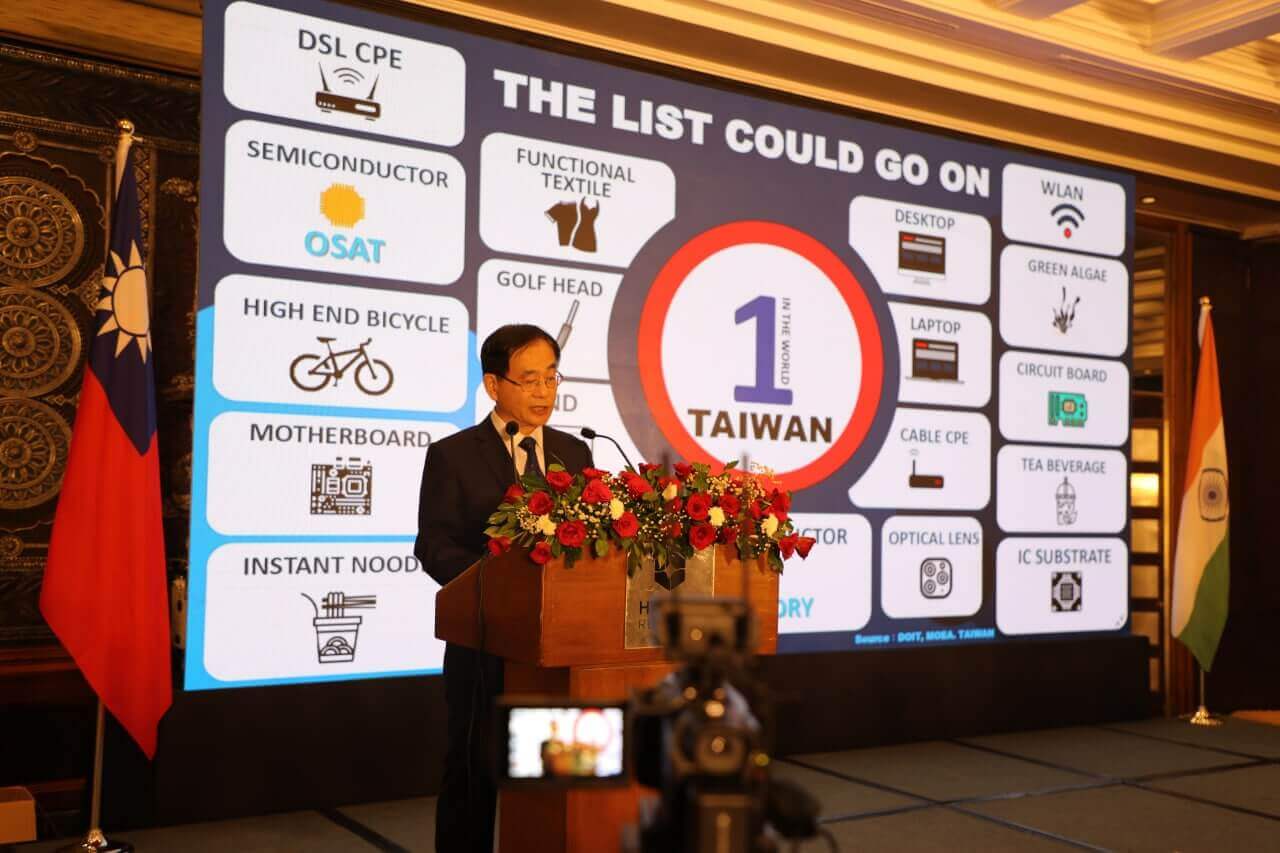Taiwan and India must sign a free trade agreement (FTA) as soon as possible, Taiwan’s de facto ambassador to India, Baushuan Ger, said on Monday.
In an interview with the Press Trust of India, Ambassador (Amb.) Baushuan said, “the signing of the FTA will further remove all trade and investment barriers and lead to a jump in bilateral trade and investment.”
“In addition, it will help attract Taiwan companies to invest in India to establish production bases, sell India-made products to the world, and help India transform into a global manufacturing centre,” he added.
The Taiwanese representative said he believes that it is “high time” for the two sides “to engage in strategic collaboration, with enhancing trade and technology cooperation being one of the most feasible areas, to begin with.”
we look forward to joining hands with our like-minded partners to safeguard peace and stability across the Taiwan Strait, to ensure a free and open Indo-Pacific and to preserve the rules-based international order : Taiwan Envoy to Delhi Baushuan Ger at 111th National Day Celeb pic.twitter.com/tomz67O9eU
— Umashankar Singh उमाशंकर सिंह (@umashankarsingh) October 7, 2022
He added that their bilateral cooperation is a “gargantuan, untapped well of potential,” pointing in particular to the cyber, space, maritime, green energy, food security, tourism, and gastronomy sectors. “Other areas of potential cooperation include machine tools, photovoltaics, biotechnology, and pharmaceuticals. We are looking forward to strengthening cooperation with India in these areas for mutual benefits,” the ambassador went on to say.
The diplomat revealed that Taiwan is facing “an increasing domestic labour shortage” and is therefore “looking for a manufacturing partner.” “India has an abundant talent pool and will make a perfect partner for Taiwan,” he said.
Baushuan asserted the two countries are brought together by their shared concern about China, saying, “Both India and Taiwan are threatened by authoritarianism; hence, closer collaboration between the two is not only desirable but necessary,” referring to China’s increased military activities in the Taiwan Strait, East and South China Seas, Hong Kong, and the Galwan Valley along the Line of Actual Control with India.
Keeping this in mind, he said that India “is just like Taiwan… standing at the forefront in the face of aggressive and belligerent authoritarian regimes.” “We need to join hands to fend off the expansion of autocracy,” he thus underscored.
The diplomat went on to thank India for standing up for justice, peace, and stability in the Taiwan Strait, noting that Taiwan’s New Southbound Policy and India’s Act East initiative have been “instrumental” in deepening bilateral engagement.
Taiwan's Sr Diplomat Baushuan Ger in new Delhi on 111th National Day
— Abhishek Jha (@abhishekjha157) October 6, 2022
- Although confronted by unceasing cross-Strait military intimidation and grey-zone threats... We will do our utmost to protect our hard-won democratic way of life without bowing to any pressure. pic.twitter.com/RvmwKuPB6t
He also accused critics of United States (US) House Speaker Nancy Pelosi’s controversial visit to Taiwan in August of wrongly believing that Taiwan and the US were “provocateurs intending to change the status quo.” In this regard, Baushuan opined that it is good to see democracies like India no longer “passively observing” but “taking active measures” to counter “non-democratic and grey-zone tactics.”
Although India and Taiwan do share formal diplomatic ties, they engage in trade and people-to-people relations. In 1995, the Indian government set up the India-Taipei Association in Taipei to help promote interactions and facilitate business, tourism, and cultural exchanges. Taiwan reciprocated the gesture in the same year by establishing the Taipei Economic and Cultural Centre in New Delhi.
"On the basis of democratic resilience and mutual trust, I am glad to note that Taiwan-India relations have gone from strength and strength", Taiwan envoy to Delhi Baushuan Ger at 111th National Day celebration reception
— Sidhant Sibal (@sidhant) October 6, 2022
In fact, following India’s eastern Ladakh border tiff with China, some Indian experts have campaigned for upgrading New Delhi’s ties with Taipei, especially in the trade and investment sectors.
India and Taiwan started negotiating an FTA in December 2021. Talks are currently centred around building a semiconductor manufacturing facility in India. If it materialises, India will become Taiwan’s second-largest semiconductor manufacturing hub after the US.
Bilateral trade has grown from $2 billion in 2006 to $7 billion in 2021, representing a 250% growth. Furthermore, FDI (foreign direct investment) inflows from the island increased almost ten-fold between 2017 and 2019.
India’s main commodity exports to Taiwan include unwrought zinc, motor vehicles, flour, meat pellets, oil seeds, and oleaginous fruits. Meanwhile, India imports electrical machinery, plastics, nuclear reactors, organic chemicals, iron, and steel from Taiwan.

